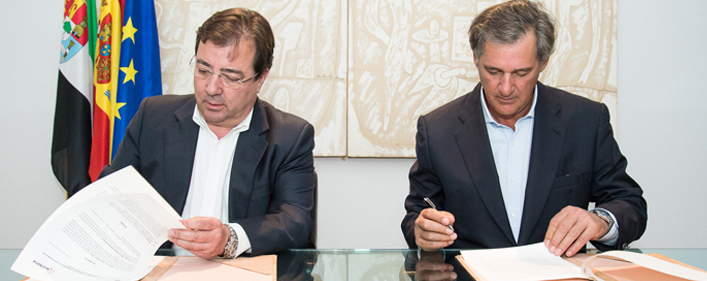- José Manuel Entrecanales, Chairman of ACCIONA, and Guillermo Fernández Vara, President of Extremadura, signed the agreement, which seeks to leverage the region's forests for energy production

José Manuel Entrecanales, Chairman of ACCIONA, and Guillermo Fernández Vara, President of the Extremadura Regional Government, today signed a Protocol for the sustainable use of forests. The agreement is part of the Extremadura Regional Government's green and circular economy strategy and reflects ACCIONA's interest in adhering to the protocol, which was signed by the Regional Government and a number of Extremadura undertakings on 21 August 2017.
The protocol is underpinned by the 'potential of the region's forest resources, fostering the sustainable use of the region's natural resources, rural development based on protection of nature and on the possibilities of energy self-sufficiency using surplus biomass'. The commitment undertaken by the two parties today also entails 'smart approaches to preventing forest fires and taking advantage of the potential for tourism and other social uses' of Extremadura's forests.
The object of the Protocol is to achieve a sustainable development model for Extremadura, and preserve and enhance the region's environmental quality and biodiversity; 70% of Extremadura's land area is covered by forest, which is frequently threatened by wildfires.
José Manuel Entrecanales, Chairman of ACCIONA, said. 'if we can develop this cutting-edge project for biomass use, energy production and reuse of forestry waste in Extremadura, it will represent a historic opportunity to put the region to the forefront worldwide in this field'.
Extremadura President Guillermo Fernández Vara believes that 'we have an enormous capacity to produce waste and we need clean energy options for using the waste, as climate change is here to stay'.
ACCIONA currently has a 15 MW biomass-fired power plant in Miajadas, Extremadura. Operational since 2010, it was the first plant in Europe to use two different fuel types (herbaceous and woody biomass), providing diversification in its fuel supply. Its annual output averages 128 GWh, equivalent to the electricity needs of 40,000 homes, and it avoids the emission of 123,000 tons of CO2 into the atmosphere each year.